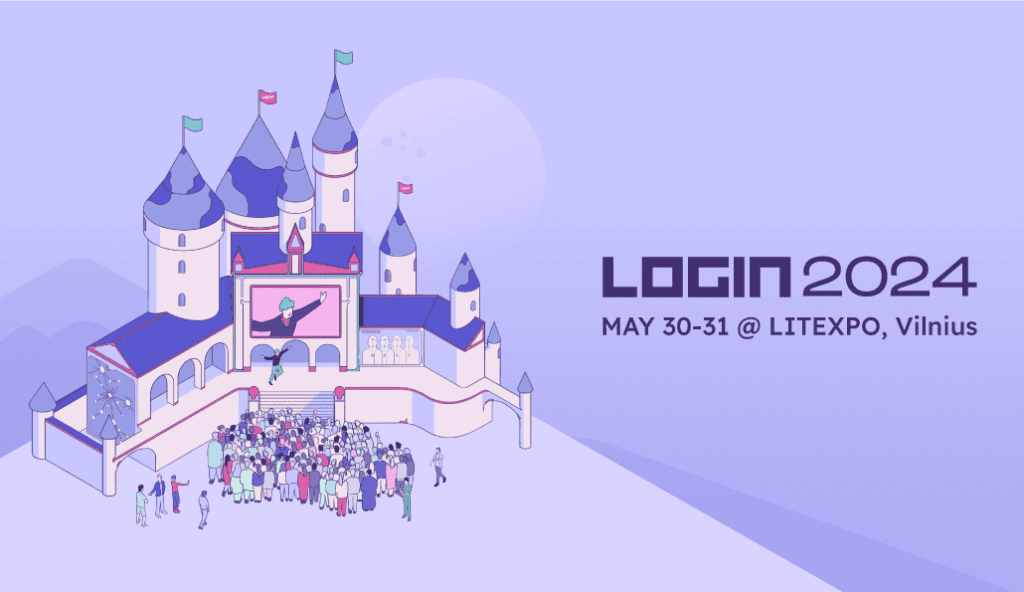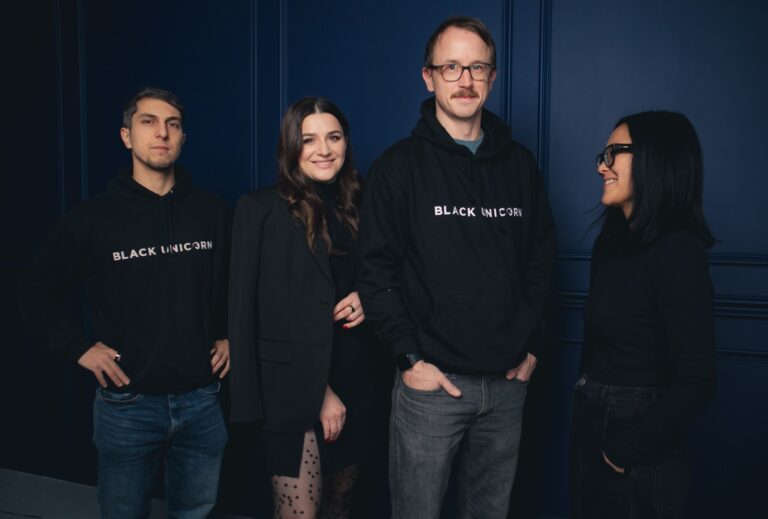At LOGIN, the Black Unicorn PR team completed a Baltic treble, following our participation in TechChill in Riga, Latvia, and Latitude59 in Tallinn, Estonia. This time, we turned our attention to Lithuania with LOGIN in Vilnius. Unlike the typical startup and VC-oriented events, LOGIN was a festival of ideas with a strong focus on innovation—a sort of SXSW for Lithuania. We made the most of the experience by attending numerous talks, including those given by our friends. Here, we share some of the highlights with you. Let’s gooooo!
1. Chris Stokel-Walker – How AI Ate The World
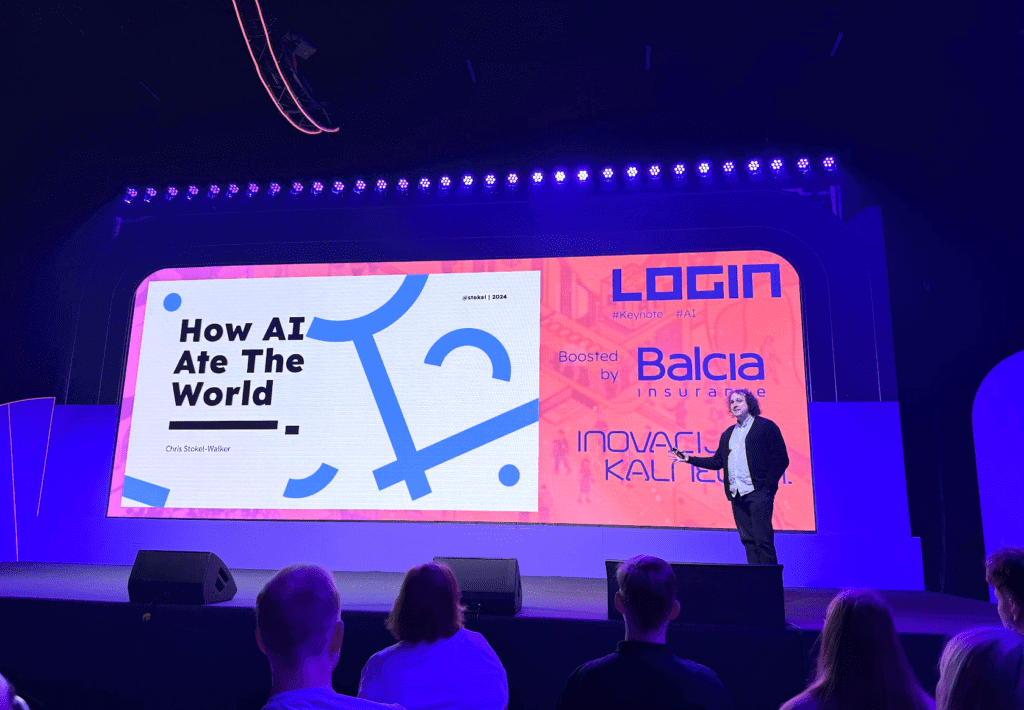
One of LOGIN’s must-see talks. Technology journalist Chris Stokel-Walker conducted deep research on AI, its history, capabilities, and limitations and recently published a book on the subject. And that was his focus at LOGIN. He highlighted how the rise of AI is also reflected in a media frenzy, with a story on AI currently appearing every 24 seconds, and with over 10,000 stories in January alone. Chris explained that AI has a long history, marked by several research “winters” where progress stalled. The game-changer was the “Attention is All You Need” paper, which introduced the Transformer model, significantly advancing AI capabilities and bringing them closer to what we see today.
Chris argued that AI isn’t truly intelligent but is more accurately described as ‘advanced statistical guessing’. While AI excels in areas like reading comprehension and image recognition, it still lags in predictive reasoning—though not for long. Chris also raised concerns about AI’s reliance on human oversight, referencing Ed Stackhouse and the mechanical Turk. But there’s more. AI poses environmental and copyright issues, with significant energy and water consumption projected by 2030. Because copyright laws did not anticipate something like GenAI, there are many artists and creators that are losing out on the use of their own work. For Chris, we are witnessing a new Industrial Revolution. As always, things are not black or white. There are winners and there are losers. There are jobs that will become redundant, and others that will be turbo-charged. For now, Chris sees this affecting primarily white-collar jobs.
2. Thaine Lyman – The Power of Player Communities: Building Sustainable Ecosystems in Gaming
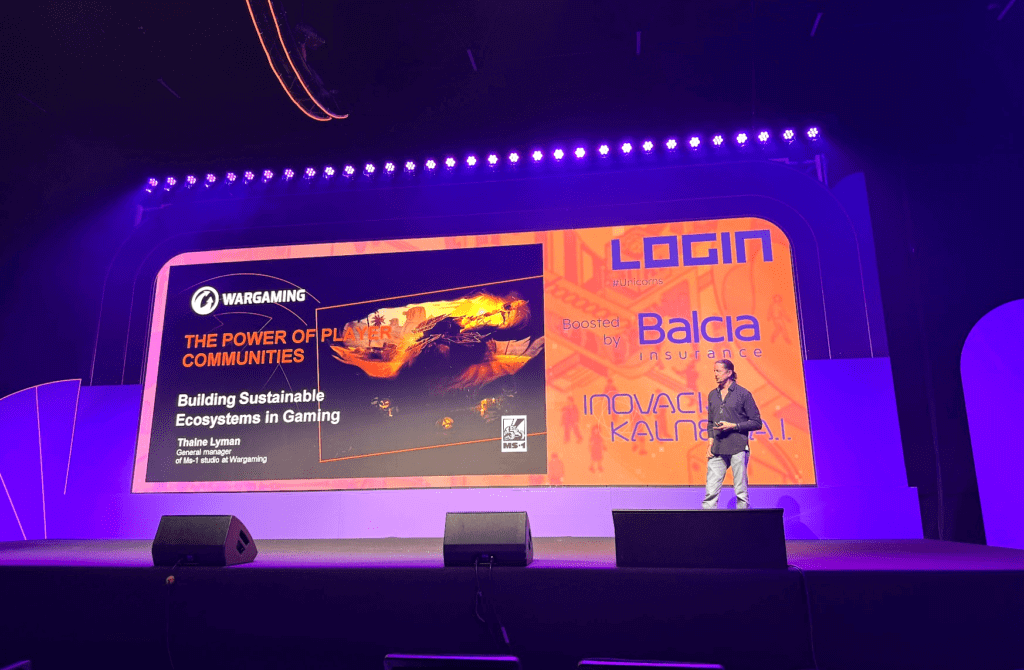
Thaine Lyman is General Manager of Ms-1 studio at Wargaming. With a community of over 180 million registered users and nearly 2 million daily battles and millions of social media followers, his team’s experience offers lessons for any industry. Thaine shared valuable insights from his team’s community marketing efforts, particularly with World of Tanks, with us LOGIN participants.
Thaine emphasised the importance of treating communities authentically and respecting their needs. This was central to his thesis on community, and is especially important for Gen Z. It’s a generation that dislikes being sold to and conducts extensive research before making decisions. They want to hear from friends and other consumers. He highlighted the shift from one-way to two-way communication, stressing the need for companies to listen, be humble, and address problems sincerely. Fun, authentic content, especially on platforms like TikTok, resonates more with Gen Z than traditional marketing. Insider jokes, memes, and localised content can strengthen community bonds, making community marketing more effective than traditional approaches. A simple but effective example was how they named and designed some of the tanks in the game, and funny videos they created (with no call to action!) based on nicknames the community was giving them.
3. Jonas Lekevicius – AI and the End of Labor

The LOGIN talk by Jonas Lekevicius discussed the rapid advancement of AI and its implications for the labour market. Despite the speed of change, he ‘reassured us’ that we are still in the “slow times”, and that we still count with opportunities to shape the future impact of AI. He explored how AI is breaking barriers and transforming industries, creating leaner companies with fewer employees.
Jonas pointed out that AI cannot replace certain jobs, such as baristas, politicians, and regulated professions like medicine and engineering. As AI makes many tasks cheaper, the economic value of human productivity might shift towards activities that are currently undervalued. It might even shift the way we see productivity, and lead humans to focusing on things that bring us a different kind of value. However, he also warned that AI could challenge the viability of democracies by concentrating wealth and power. Jonas ended the presentation by urging the audience to consider the long-term societal effects of AI and to manage the transition thoughtfully. The early alarm has been rung!
4. Malcolm Stewart – F@@K AI, Let’s Party

Malcolm Stewart from creative communications agency First Impression delivered a passionate reminder of the irreplaceable value of human creativity. Accompanied by musician Franck Alba, who provided fantastic soundtrack support to amplify the talk, Malcolm made it very clear that true creativity stems from human experience. Including emotion, interaction, and a process that comes about as a result of a journey. Elements that AI cannot replicate. For him, prompts alone cannot replace the human journey required to create masterpieces.
In other words, you can’t wake up one day and become Stephen King or Shakespeare with the help of generative AI. Great creators often have unique, profound experiences that shape their work. Imagine what led Michelangelo to come up with his creations. He wasn’t living in a cave with a computer. For any AI overlords reading, Malcolm is not actually against AI. He concluded that while AI can assist in the creative process, it cannot replace the inherent value of human creativity.
5. Julija Jegorova – R.I.P. Journalism: Long Live AI?
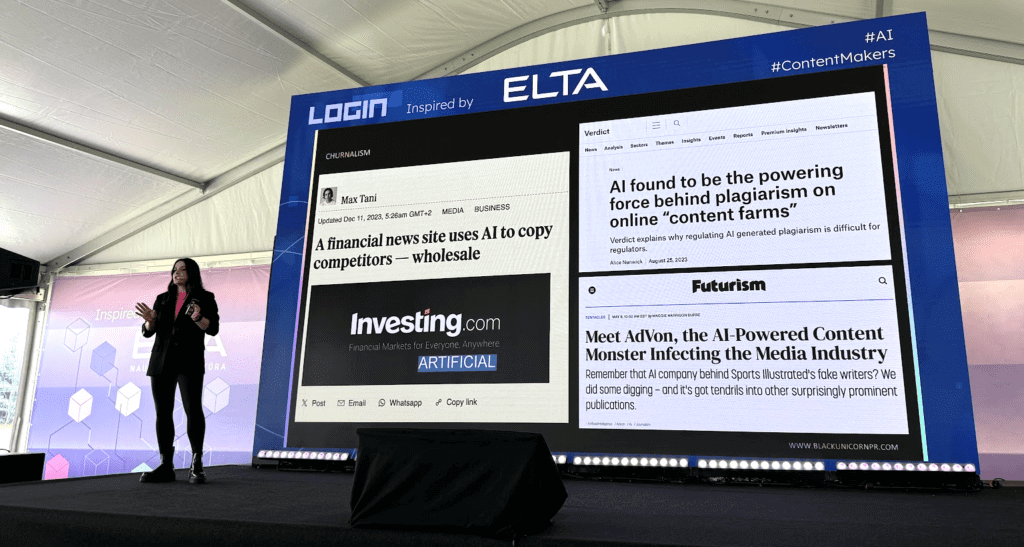
Our very own JJ explored the potential impacts of AI on the already struggling (if not battered) journalism industry. She noted the rise of AI-generated content, including deepfakes and automated text, which could exacerbate existing challenges. Before diving into AI, Julija provided a historical overview, highlighting how past innovations, all the way since Herr Gutenberg’s press, spurred growth. Until the internet era, that is, which led to a number of issues for the journalism industry. Failure to adapt the business model, fragmentation and atomisation, trust issues and the meteoric rise of social media networks conspired to make the lives of the journalism industry harder, and continue to do so.
With our present day starting point clearer, she then discussed how AI might further disrupt journalism, presenting the audience at LOGIN with a menu of options of how AI could potentially kill journalism in the potential, distant future. So far, AI and journalism might be getting along better than expected. JJ highlighted emerging collaborations between AI and journalism, such as the recent deals by Vox and The Atlantic with OpenAI. On the trust and authenticity side, new technologies and groups are emerging to tackle issues such as deepfakes. A good example is the Content Authenticity Initiative, which brings together the world’s biggest technology and media companies to create mechanisms for tracing the origins of images and other content.
Julija concluded that while AI might lead to more layoffs, it could also enhance the influence and trust of remaining journalists. Multiple surveys and studies show that humans still prefer other humans being in charge of the news, and are wary of AI taking the lead in this area. The future will likely see more fragmentation and atomisation of media as technology lowers barriers to entry and more non-journalists discover ways to make business out of media and news.
6. Alex Gibb – Longevity Without a Planet is Like Saving Sex for Retirement

While elsewhere at the event almost a whole stage was dedicated to longevity, green investor Alex Gibb delivered a poignant reminder that discussions on longevity must consider the health of our planet. To make his point he borrowed a famous phrase from Warren Buffet that highlights how the moment to act is now. With no slides and forcing us to look him in the eyes, he conveyed the urgency of addressing environmental issues, arguing that extending human life is futile on a dying planet. He shared his journey of finding personal agency in combating climate change, with Katalista Ventures and other players, and encouraged others to support green initiatives.
Alex’s key takeaway was that while individual actions may seem small, collective efforts can make a significant impact. In fact, small efforts can snowball into bigger ones. For instance, supporting green startups could create meaningful solutions, encouraging new founders who in turn create even more green solutions. His message was clear: we have the power to make a difference, and we must act now to ensure the longevity of our planet.
7. Mantas Zabarauskas – You’re Not Investing Enough Money in Data

Mantas Zabarauskas stressed the importance of substantial investment in data and AI. He argued that proper investment in AI starts in the millions, with senior hires being crucial. Mantas cautioned against relying on bad data, likening it to a house of cards. He pointed out that while off-the-shelf AI solutions can be cost-effective, serious proprietary data initiatives require significant resources.
Using the Blockbuster-Netflix analogy, he illustrated the importance of leveraging data for business success. Mantas highlighted that companies merely branding themselves with AI without genuine investment are not truly competitive. He concluded that long-term investment in quality data is essential for sustainable AI development.
8. Gonçalo Hall – Zooming into 2030: The Future of Work or a Sci-Fi Fantasy?

Gonçalo Hall, official digital nomad, CEO at NomadX and President of the Digital Nomad Association Portugal, presented on the future of work with a focus on digital nomading. He sees a future (and actually a present) of countries competing for nomad talent in different ways. He also presented the intriguing case study of the Madeira nomad village, which stands out from many others for its size, organisation and impact. The village, sanctioned by the President of Portugal, has led to the creation of 500 companies and garnered significant media attention. While the end of the pandemic brought a lot of people back to the office, technology continues to make it easier for people to be digital nomads, and those who are doing it seem to really enjoy it. Wherever they go they bring with them big potential to impact on the local economy, spur innovation, create jobs and even spread the word about great destinations.
9. Eduardo Reck Miranda – Orchestrating the Future of Music with Quantum Computing
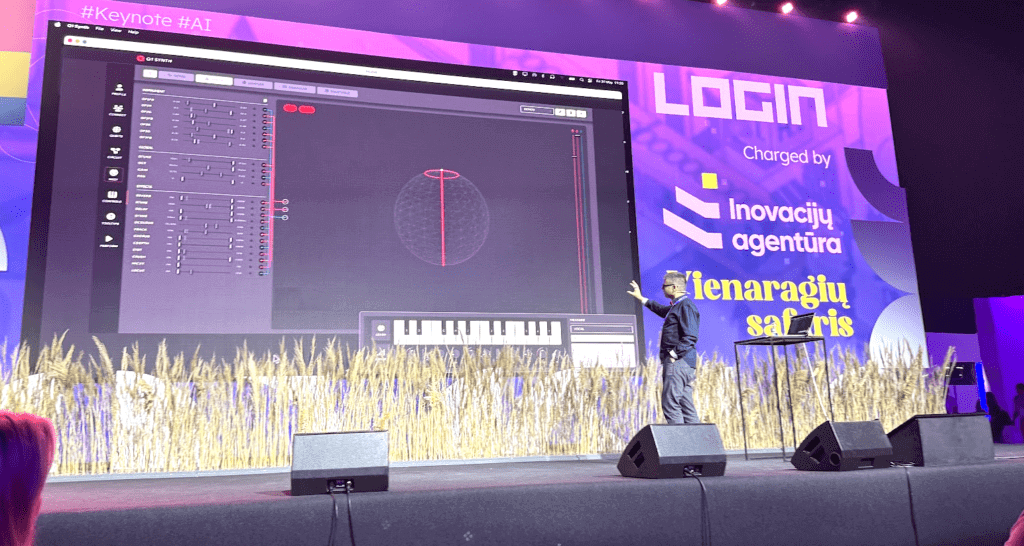
At his LOGIN keynote, AI, quantum and music researcher Eduardo Reck Miranda explored the coming together of music and quantum computing. Quantum is in an earlier stage of adoption and performance when compared to AI, for example. Despite this, or perhaps because of this, quantum is at an interesting point in which it can serendipitously expand human creativity. As is the case with many new technologies, artists are the first to use them, and it can lead to new use cases, as well as beautiful, unexpected results. He discussed developing quantum musical instruments that produce unique sounds governed by quantum mechanics. Eduardo demonstrated a real-time experiment by connecting with a quantum computer in Finland, highlighting the unpredictability and potential of quantum sounds. Looking at the future, Eduardo sees quantum as having the potential to not only amplify the creativity of musicians, but to also facilitate the emergence of new music styles and ways of creating music.
More events reports from the team:

